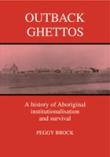
Latest Issues
AbstractHistoryArchive Description
'Up until the 1970s, a large proportion of Aboriginal people in Australia had some experience in institutions as part of federal assimilation and protection policies. Focusing on three communities in South Australia, this book attempts to understand the consequences of this institutionalisation for Aborigines and Australian society in general. Peggy Brock uses the word 'ghetto' to evoke the nature of the missions in which, for generations, many Aboriginal people settled, as ghettos both oppress and nurture those who live within them. The missions were part of policies to control and segregate Aborigines, but the book shows that they often chose to live in the missions to ensure their own survival. Within the missions, Aborigines were able to establish distinctive communities and construct a strong, modern identity. The three communities considered in the book - Poonindie, Koonibba and Nepabunna - existed during distinct but overlapping periods and had varying responses to colonialism and mission life. In many cases, Aboriginal people associated themselves with the missions because they met urgent needs for survival: protection from a hostile world, access to rations, education and training in European skills. In fact, the missions for many became home. For others however, the emotional turmoil caused by the pressure to embrace Christianity on the one hand and the desire to maintain traditional ways on the other became unbearable.' (Source: WorldCat website)
Contents
- Jimmy Thomas Richards, single work biography (p. 71, 75)
- Jack Highfold and Jack Jebydah, single work biography (p. 78, 79)
Publication Details of Only Known VersionEarliest 2 Known Versions of
Works about this Work
-
Rethinking Approaches to Women in Missions : The Case of Colonial Australia
2011
single work
criticism
— Appears in: History Australia , vol. 8 no. 3 2011; (p. 7-24) 'This paper focuses on three women in Protestant missions from the later decades of the nineteenth century to the 1920s, examining the circumstances that made cross-cultural exchanges of faith, learning, family and work on Australian missions distinctive. On sites where missionaries, Indigenous residents, government bureaucrats and neighbouring settlers were all stakeholders with competing interests, the white mission women held out the promise to Indigenous Christian women of creative new life opportunities. They believed, mistakenly, that they could deliver on their promises, despite living in the midst of a society and working within settler governmental regimes that were thriving on Indigenous dispossession. The paper considers fragmentary glimpses of these concerns as they emerged within the writings of white and Indigenous Christian women in Manunka (South Australia), Mapoon on Cape York (Queensland) and East Gippsland (Victoria).' (Author's abstract)
-
[Review Essay] Outback Ghettos : A History of Aboriginal Institutionalisation and Survival
1994
single work
essay
— Appears in: Australian Aboriginal Studies , no. 1 1994; (p. 61-63)'This is an important book. It represents a detailed enquiry into issues of major significance, draws on a wide range of sources including oral testimony, and affords ample evidence of a resolute, open-minded approach, free of ideological blinkers. Ten years ago, historians in this country lacked the capacity to approach contact history with such sensitivity. This is not to say, however, that the book is free from problems.' (Introduction)
-
Rethinking Approaches to Women in Missions : The Case of Colonial Australia
2011
single work
criticism
— Appears in: History Australia , vol. 8 no. 3 2011; (p. 7-24) 'This paper focuses on three women in Protestant missions from the later decades of the nineteenth century to the 1920s, examining the circumstances that made cross-cultural exchanges of faith, learning, family and work on Australian missions distinctive. On sites where missionaries, Indigenous residents, government bureaucrats and neighbouring settlers were all stakeholders with competing interests, the white mission women held out the promise to Indigenous Christian women of creative new life opportunities. They believed, mistakenly, that they could deliver on their promises, despite living in the midst of a society and working within settler governmental regimes that were thriving on Indigenous dispossession. The paper considers fragmentary glimpses of these concerns as they emerged within the writings of white and Indigenous Christian women in Manunka (South Australia), Mapoon on Cape York (Queensland) and East Gippsland (Victoria).' (Author's abstract)
-
[Review Essay] Outback Ghettos : A History of Aboriginal Institutionalisation and Survival
1994
single work
essay
— Appears in: Australian Aboriginal Studies , no. 1 1994; (p. 61-63)'This is an important book. It represents a detailed enquiry into issues of major significance, draws on a wide range of sources including oral testimony, and affords ample evidence of a resolute, open-minded approach, free of ideological blinkers. Ten years ago, historians in this country lacked the capacity to approach contact history with such sensitivity. This is not to say, however, that the book is free from problems.' (Introduction)
- Nepabunna Mission (1931 - 1977), Northern Flinders Ranges, South Australia,
- Koonibba Mission, South Australia,
- Poonindie Mission, Northern Flinders Ranges, South Australia,



